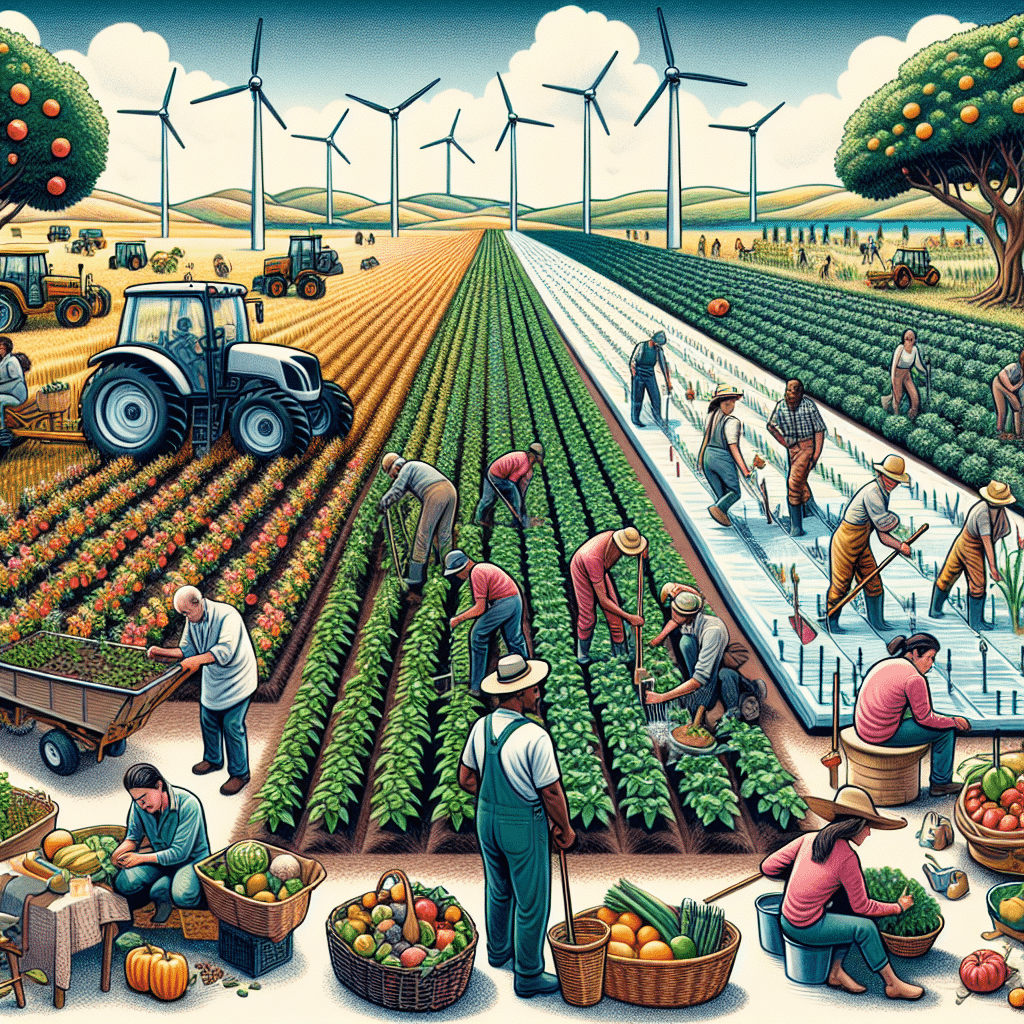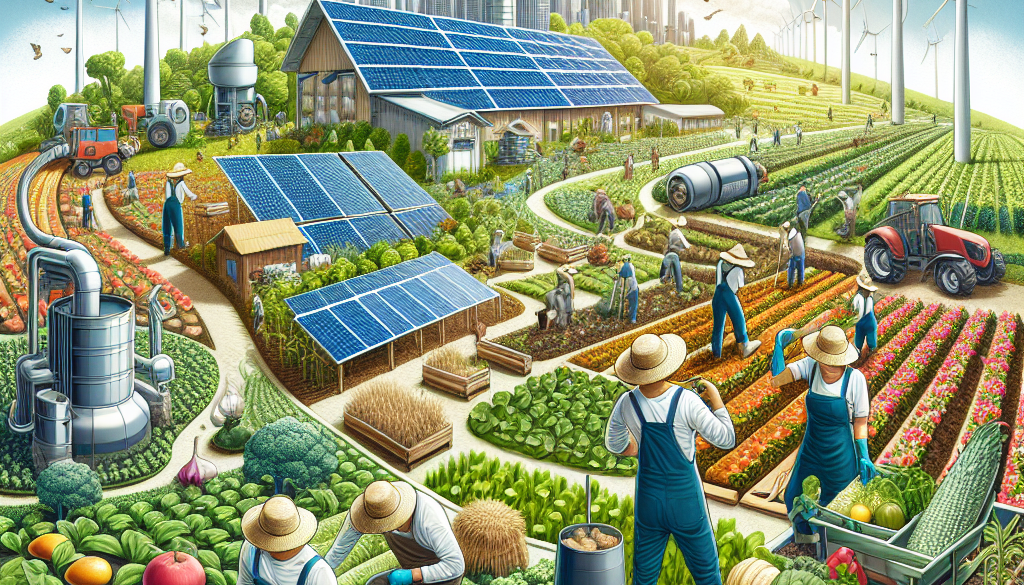Building an Era of Eco-Friendly Food Production Process
-
Table of Contents
- Eco-Friendly Food Production: Paving the Way for a Sustainable Future
- The Current State of Food Production and Environmental Impact
- Principles of Eco-Friendly Food Production
- Strategies for Building an Eco-Friendly Food Production Process
- Regenerative Agriculture
- Organic Farming
- Agroforestry and Permaculture
- Water Conservation Techniques
- Renewable Energy in Agriculture
- Local and Seasonal Food Systems
- Challenges and Opportunities
- Case Studies and Success Stories
- Conclusion: Embracing a Sustainable Food Future
- ETprotein: A Step Towards Sustainable Nutrition
Eco-Friendly Food Production: Paving the Way for a Sustainable Future

The global food production system is at a crossroads. With the world’s population projected to reach nearly 10 billion by 2050, the demand for food is expected to increase significantly. However, traditional food production methods are often associated with environmental degradation, including deforestation, water scarcity, and greenhouse gas emissions. As a result, there is an urgent need to transition to eco-friendly food production processes that can sustainably feed the growing population while minimizing harm to the planet.
The Current State of Food Production and Environmental Impact
Today’s food production processes are a major contributor to climate change, responsible for approximately one-quarter of the world’s greenhouse gas emissions. Industrial agriculture practices, such as the use of chemical fertilizers and pesticides, intensive livestock farming, and monoculture cropping, have led to soil degradation, water pollution, and loss of biodiversity. These practices are not only unsustainable but also threaten food security and public health.
Principles of Eco-Friendly Food Production
Eco-friendly food production is based on principles that prioritize the health of the environment, producers, and consumers. These principles include:
- Sustainable land management
- Conservation of water resources
- Reduction of greenhouse gas emissions
- Minimization of chemical inputs
- Enhancement of biodiversity
- Support for local economies and fair labor practices
Strategies for Building an Eco-Friendly Food Production Process
To achieve a more sustainable food system, several strategies can be implemented:
Regenerative Agriculture
Regenerative agriculture is a holistic approach to farming that seeks to restore soil health, increase biodiversity, and improve the water cycle. Practices such as crop rotation, cover cropping, and reduced tillage can enhance soil fertility and sequester carbon, helping to mitigate climate change.
Organic Farming
Organic farming eschews synthetic fertilizers and pesticides in favor of natural alternatives. By doing so, it reduces pollution and promotes healthier ecosystems. Organic farms often have higher levels of soil organic matter, which can improve water retention and support diverse microbial life.
Agroforestry and Permaculture
Agroforestry integrates trees and shrubs into agricultural landscapes, providing habitat for wildlife and additional sources of income through timber or fruit production. Permaculture designs mimic natural ecosystems, creating self-sustaining food systems that require minimal external inputs.
Water Conservation Techniques
Implementing water-saving technologies such as drip irrigation and rainwater harvesting can significantly reduce water usage in agriculture. These techniques ensure that crops receive the right amount of water at the right time, minimizing waste and protecting water resources.
Renewable Energy in Agriculture
Transitioning to renewable energy sources, such as solar or wind power, for agricultural operations can reduce reliance on fossil fuels and lower greenhouse gas emissions. Solar-powered irrigation systems and electric farm vehicles are examples of how renewable energy can be integrated into farming practices.
Local and Seasonal Food Systems
Supporting local food systems reduces the carbon footprint associated with long-distance transportation of food. Seasonal eating also encourages the consumption of fresh, nutrient-rich foods and supports local economies.
Challenges and Opportunities
While the shift to eco-friendly food production is necessary, it is not without challenges. These include the need for investment in new technologies, training for farmers in sustainable practices, and changes in consumer behavior. However, the opportunities for innovation, job creation, and improved health outcomes are significant.
Case Studies and Success Stories
There are numerous examples of successful eco-friendly food production initiatives around the world. For instance, the Rodale Institute’s Farming Systems Trial has demonstrated that organic farming can yield as much as conventional farming while using 45% less energy and producing 40% fewer greenhouse gas emissions. Similarly, the Zero Budget Natural Farming movement in India has empowered thousands of farmers to adopt chemical-free, low-cost farming methods that improve soil health and increase yields.
Conclusion: Embracing a Sustainable Food Future
The transition to eco-friendly food production is not just a necessity for environmental sustainability; it is also an opportunity to create a healthier, more equitable food system. By adopting sustainable practices, we can ensure that future generations have access to nutritious food without compromising the health of our planet.
ETprotein: A Step Towards Sustainable Nutrition
In line with the principles of eco-friendly food production, ETprotein company’s protein products offer a sustainable alternative to traditional animal-based proteins. Their range of organic plant-based proteins, including rice, pea, and various seed proteins, are produced with a commitment to environmental responsibility and quality.
ETprotein’s products are non-GMO, allergen-free, and boast a high purity level, making them an excellent choice for consumers looking to reduce their environmental footprint while maintaining a balanced diet. By choosing ETprotein, consumers and manufacturers can support sustainable agriculture and contribute to a greener food industry.
About ETprotein:
ETprotein, a reputable protein and L-(+)-Ergothioneine (EGT) Chinese factory manufacturer and supplier, is renowned for producing, stocking, exporting, and delivering the highest quality organic bulk vegan proteins and L-(+)-Ergothioneine. They include Organic rice protein, clear rice protein, pea protein, clear pea protein, watermelon seed protein, pumpkin seed protein, sunflower seed protein, mung bean protein, peanut protein, and L-(+)-Ergothioneine EGT Pharmaceutical grade, L-(+)-Ergothioneine EGT food grade, L-(+)-Ergothioneine EGT cosmetic grade, L-(+)-Ergothioneine EGT reference grade and L-(+)-Ergothioneine EGT standard. Their offerings, characterized by a neutral taste, non-GMO, allergen-free attributes, with L-(+)-Ergothioneine purity over 98%, 99%, cater to a diverse range of industries. They serve nutraceutical, pharmaceutical, cosmeceutical, veterinary, as well as food and beverage finished product distributors, traders, and manufacturers across Europe, USA, Canada, Australia, Thailand, Japan, Korea, Brazil, and Chile, among others.
ETprotein specialization includes exporting and delivering tailor-made protein powder and finished nutritional supplements. Their extensive product range covers sectors like Food and Beverage, Sports Nutrition, Weight Management, Dietary Supplements, Health and Wellness Products, and Infant Formula, ensuring comprehensive solutions to meet all your protein needs.
As a trusted company by leading global food and beverage brands and Fortune 500 companies, ETprotein reinforces China’s reputation in the global arena. For more information or to sample their products, please contact them and email sales(at)ETprotein.com today.












